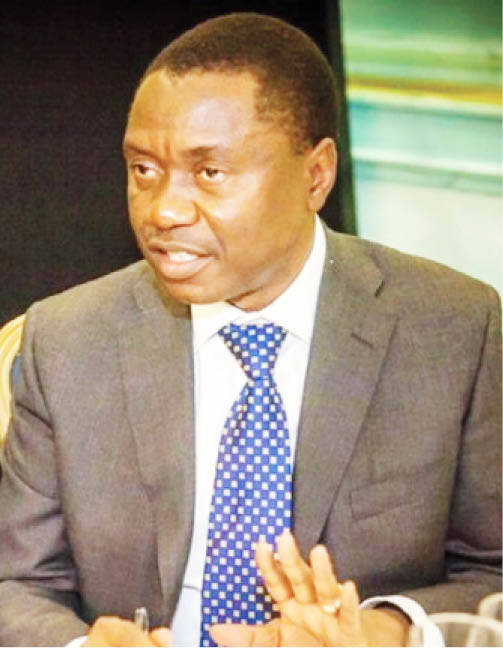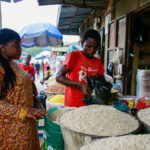
Thomas Etu is the chairman of Fertilizer Producers and Suppliers Association of Nigeria (FEPSAN) and member of the Presidential Fertiliser Initiative, a Federal Government’s initiative to make the input affordable and available to farmers. In this interview, he discusses the gains recorded through the initiative, among other issues in agriculture development in the country.
Give us a proper idea of how this initiative started?
The Presidential Fertiliser Initiative started following an invitation from the presidency to the president of the Fertiliser Producers Association, which is my good self, through the Chief of Staff, Malam Abba Kyari. The President made it clear that he was worried that the price of fertiliser was still N9,000 per bag. He then mandated us to see how we can make the prices more affordable and the input available to the Nigerian farmers. FEPSAN then designed a programme, a template; that led to the forming of the Presidential Fertilizer Initiative, headed by the Governor of Jigawa State and coordinated by the Chief of Staff to the President, Malam Abba Kyari.
This committee came out with a programme that was designed to engage with the input suppliers on the raw material we need in the fertiliser blending process.
Basically, 63 percent of these raw materials are available in Nigeria; they include Urea which is Nitrogen, produced in Port Harcourt; and limestone, which forms the Calcium input in fertilisers that is produced by the West Africa Fertiliser Company in Okpela in Edo State. These form just about 63 percent of the raw materials needed. For imported raw materials, we have 21 percent phosphate from Morocco and 16 percent potassium from Belarus. This is how we designed what we import. You may not know but we have potash in Nigeria but it is not available in commercial quantity.
By sourcing 63 percent of raw materials found in the country, we have saved the country $200 million in foreign exchange. What we have done is make sure that we adopt a cost-saving model, as against the previous regime of subsidy. This programme therefore has saved the Nigerian government N60 billion in subsidy.
Our programme is so tight that there is no any type of subsidy in it, which is why we call it a cost-saving model. This was how this initiative was born. Because we were importing the main active ingredient from Morocco, President Muhammadu Buhari made a trip to that country to negotiate with the Moroccan leadership on how we could get phosphate on a government-to-government basis. This yielded a good deal for the country in pricing.
It was left for the committee to negotiate the potash with the government of Belarus. It was therefore the discounts we got from these deals and added to the value we got from sourcing 63 percent of other raw materials locally that we then transferred to the farmers. And that was how we were able to reduce the price to N5,500 per bag. This is so because we book the Agro dealers at N5,000 and allow them to sell to the end-users at N5,500, leaving them with a margin of just N500 for each bag sold.
Were you already nursing the idea before the call by the presidency for the intervention? How was it so easy to come up with the template?
It is quite interesting because when I got the first phone call from the Chief of Staff, Malam Abba Kyari, I thought it was one of those calls from people with strange and bogus proposals. I did not know then and therefore dropped the call when he began to mention what Mr President wanted us to do. But he repeated the call after about five minutes and I still hung up on him. But I had to activate my TrueCaller when the calls would not stop and that was when I knew that the person trying to reach me was the Chief of Staff to the President because an hour later, he called again and his name appeared. I then picked the call and apologised to him and we laughed it off because he understood. It was then he fixed an appointment.
I am not a member of any of the political parties in Nigeria and did not have any relationship with either him or the president prior to this meeting. I am sure they called us because our group, FEPSAN, is the biggest player in that aspect of the Nigerian agriculture industry and I am sure that was why the government thought it could work if they partnered with us.
How were you able to rally the industry to buy into the initiative, given that you are in competition among yourselves?
I cannot tell you it was easy. There were a lot of challenges. But I must commend Mr President for displaying the political will needed to drive the process. I must also commend the Chief of Staff, who, at our committee meetings, we call the Chief Whip, for his role in ensuring the harmonization of interests of all stakeholders.
The challenges of bringing competitors together were there, especially given that the margins are not high. But we had to make people understand that we needed to get this done for the benefit of Nigerians. We are Nigerians and we need to create jobs for Nigerians. We have 32 blending plants in Nigeria that were moribund. Out of this, only five plants were running and at 10 percent capacity because excessive emphases were laid on importation, which also meant, by its very implication, that we were exporting our jobs even when we cannot provide jobs here in Nigeria.
Our foreign exchange which was scarce, we were spending it in building other countries’ economies. Anybody that is committed to this nation will know that unemployment is raging like fire. Some of the factories have been out of operation for 15 to 20 years. So we saw it as an opportunity to help get the country back on track. We were lucky that we have a president that has the interest and political will to make a difference and he was ready to make this initiative to work. We had no option but to key into this willingness. It was tough. I practically had to meet each and every one of them and make them understand that this is not politics but about building our nation and each one of us had a role to play.
Today, Nigerians can testify, farmers can testify that it has been a great initiative. I give you an example; the revolution that happened in rice production, the revolution that happened in maize production. Let me even go back to what happened in fertiliser production. What will interest you is that in 2017, because of the Presidential Fertiliser Initiative, Nigeria’s consumption stood at 1,570,000 metric tons of fertiliser. This was the first time in the history of this country right from independence. And this happened without the government providing any form of subsidy.
I am convinced that within the next two years, the country will be self-sufficient in NPK and we may have to start exporting. Currently, our neighbouring countries are relying on Nigeria for their NPK needs. Cameroon, Chad, Niger, Benin and Togo are currently buying from us. Within one year, direct and indirect jobs that were created by this Presidential Fertiliser Initiative are over 150,000.
What is critical to the farmers are the inputs. Before now, the farmer buys a bag of 50kg fertilizer at between N9,000 and N13,000. Today, he gets it at N5,500. This means that his production will change upwards, his inputs will increase. Before the initiatives of this government, farmers were producing just above 2,000 metric tons, today, they are getting 7,000 metric tons. This is because of the interventions of this administration. Last year, for the first time in the history of this country, fertiliser was delivered early and affordable, even for dry season farming. This year it is the same thing.
Who would you say are the biggest beneficiaries of the initiatives?
I would say it is our country Nigeria as a whole; the Nigerian farmer. Let us look at this again: the initiative has created a lot of jobs in the market and moribund fertiliser blending plants have started operations. And when we talk about the gains, we talk about all the layers along the value chain. There are various levels of support it provides for the economy. We have the agro dealers who earn margins from breaking our bulk and selling to farmers; we have the people that make the bags that the fertilizers are packaged in; we talk about those who make the threads for sewing these bags; we are talking about transportation. Last year we deployed 33,300 trucks to move products around nationwide and it was so well coordinated we recorded no single incident of diversions or accident.
How can the country leverage the successes of the Presidential Fertilizer Initiative to ensure that it begins to add value to the primary products of agriculture?
The government through this agency and the Sovereign Wealth Authority are thinking along that line. I know there is talk about a Commodity Exchange to ensure that farmers are not discouraged by an eventual over-supply. We also think that government has plans that will ensure that in driving this process, the excesses will be channeled into the Strategic Reserve. So with all these plans and strategic initiatives, the farmer will lose nothing even in times of so-called glut.
Where will this initiative take the Nigerian agriculture sector to in the next three years?
In three years’ time, I am certain that Nigeria will be self-sufficient in most staple foods. I am certain that it would have reduced unemployment drastically because agriculture will regain its position as the biggest employer of labour in the country. I am also convinced that with the ramp up in food production, processing industries will begin to spring up, taking off the excesses from the farmers, employing even a larger number of people and packaging Nigerian agro produce for export.

 Join Daily Trust WhatsApp Community For Quick Access To News and Happenings Around You.
Join Daily Trust WhatsApp Community For Quick Access To News and Happenings Around You.



